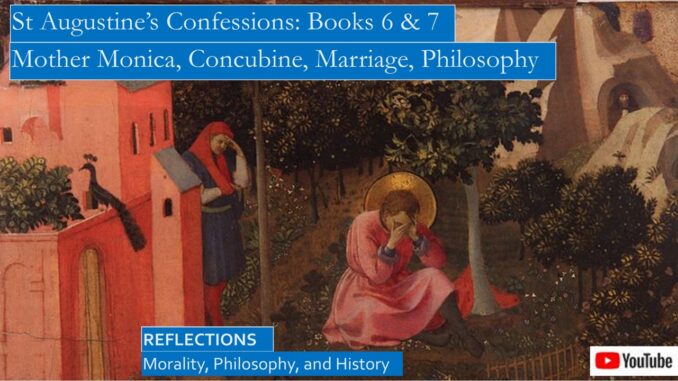
Why should we reflect the young St Augustine’s budding career in Rome, Milan and Carthage as he describes in Books 6 and 7 of his spiritual autobiography, the Confessions?
How did his study of philosophy, and listening to the sermons of St Ambrose, convince the young Augustine of the truth of the Christian faith, causing him to reject the heretical doctrines of the Manichean heresy?
How did the teachings of St Ambrose answer the questions young Augustine had about the truth of the Christian Scriptures?
Why did the young Augustine permit his mother Monica to arrange a politically motivated marriage, compelling him to send away his concubine of fifteen years, mother of their son Adeodatus, meaning gift from God?
YouTube Video: Confessions of St Augustine, Youth and Adolescence, Books 1 and 2
https://youtu.be/gdK1a3AbI9w
St Augustine’s Confessions: Manichaeism, NeoPlatonic Philosophy, and Monica’s Prayers, Books 3, 4, and 5
https://youtu.be/ydskqlgZSrE
St Augustine’s Confessions: Mother Monica, Concubine, Marriage, and Philosophy, Books 6 & 7
https://youtu.be/AjGbBozIReY
YouTube script, with more Amazon book links:
https://www.slideshare.net/BruceStrom1/st-augustines-confessions-mother-monica-concubine-marriage-and-philosophy-books-6-7
St Augustine’s Confessions, His Conversion, Baptism, St Monica’s Death, and Philosophy, Books 8 & 9
https://youtu.be/Vijtjxm3Ta0
St Augustine’s Confessions, Memory, Soul and Mind Book 10
https://youtu.be/xTHmGhGG6Bk
St Augustine’s Confessions, Time, Creation Genesis, Pagan Myths, and Manicheism Books 11 – 13
https://youtu.be/Ff-XsE5CuSo
ST AUGUSTINE CONFESSIONS, BOOKS 6 AND 7
The Confessions were written soon after St Augustine was drafted to be the co-bishop of Hippo, near Carthage. The Confessions are not only a confession of faith and a confession of sin and sinful longings, but also a mirror into his soul, exploring his innermost motivations. The style is unique, Bishop Augustine addresses his Confessions as a prayer to God, addressing God directly, imbedding verses of Scripture and the Psalms directly into his Confessions as he writes these words on his soul.
In the first two chapters of his Confessions, St Augustine reflects on:
https://youtu.be/gdK1a3AbI9w
- His birth, youth and his spiritual development under his Christian mother Monica and his pagan father Patricius.
- Speculations on how children learn, and how children and mankind are affected by Original Sin.
- How the incident where young Augustine and his gang of youngsters stole many pears from a neighbor’s orchard was a reflection of this Original Sin of Adam and Eve eating the forbidden fruit in the Garden of Eden.
In Chapters 3, 4, and 5 we reflect on the budding career of young Augustine, after he takes a ship to Italy. He reflects on:
https://youtu.be/ydskqlgZSrE
- His career in teaching and rhetoric first in the city of Rome, then Milan,
- His growing appreciation of NeoPlatonic philosophy,
- And his growing doubts about the heretical doctrines of the Manichean sect that he had joined.
We reviewed the differences between Christianity, where the Almighty God is the source of all goodness, where evil is but a corruption of the good, and the dualistic Manichean system, where good and evil are more or less equal, and eternally battle for supremacy. [1]
| Christian Beliefs | Manichaeism Beliefs |
| Almighty God is omniscient, omnipresent, goodness itself | Dualistic cosmological struggle between light and darkness |
| Evil is a corruption of the good and the absence of virtue | Evil and virtue are co-equal, eternally engaged in struggle |
| Jesus Christ is the Son of God | Jesus is another prophet |
| Based on Jewish Old Testament | Derived from Zoroastrianism |
| Old Testament is Holy Scripture | Old Testament was corrupted to impose Judaism on Christianity |
| After death is judgment and resurrection of the body | Belief in reincarnation, only the perfect break free to Paradise |
YOUNG AUGUSTINE WELCOMES HIS MOTHER MONICA TO ITALY
When we left St Augustine in Milan at the end of Book 5, he had decided to leave the heresy of the Manichees and, impressed by the teachings of the sermons of St Ambrose, he decided to become a Catholic catechumen, pondering philosophy as he decided whether he would be baptized. This is also somewhat of a turning point, as St Ambrose was one of the last of the Church Fathers in the Western Roman Empire who wrote their theological treatises in Greek, while St Augustine, along with Tertullian, was one of the first Latin Church Fathers who had a limited command of the Greek language.
At the end of Book 5, we also left St Monica, mother of St Augustine, on the docks of North Africa as her son sailed away to Italy, leaving her behind, as her mothering had been a bit too smothering, and he wanted to make his way in the world without her tagging so closely behind.
But at the beginning of Book 6 of the Confessions, we learn that St Monica, indeed, followed her son, who by this time gained an influential teaching position in Milan. When Diocletian had split the Roman Empire into East and West, the Western imperial court was moved to Milan.[2]
St Augustine was happy that his mother joined him, perhaps he was successful in training her so her mothering would not be so smothering, or in theological terms, that her love was no longer impure, but that she now loved him with a purer love through God. He had sailed to Italy with his concubine and their son Adeodatus, joining their small religious community was his mother Monica and a good friend and former student, Alypius.
Bishop Augustine remembers fondly her love for her wayward son, “in Christ she believed that before she left this life, she would see me a faithful Catholic.” St Augustine fondly remembers his mother’s arrival on the sailing ship she caught from North Africa: “Now my mother had come to me, for her piety had given her strength to follow me over land and sea, facing all perils in the sure faith she had in you, O God.”
St Monica even has a saint’s story: “When the ship was in danger, it was she who put heart into the crew, the very men to whom passengers” “turn for reassurance when they are alarmed. She promised them that they would make the land in safety,” because God had reassured her in a vision. “She found that I, too, was in grave danger because of my despair of discovering the truth. I told her that I was not a Christian, but at least I was no longer a Manichee.”[3]
Young Augustine appears to have been intimidated by Bishop Ambrose, his Confessions do not retell any private spiritual conversations he had with Ambrose. St Augustine remembers, “All could approach Ambrose freely and it was not unusual for visitors to be announced, so that often, when we came to see him, we found him reading like this in silence, for he never read aloud.” This attests to the fact that ancient works were, indeed, hard to read, capitalization and punctuation was one of the Carolingian reforms under Charlemagne. St Augustine continues, “We would sit there quietly, for no one had the heart to disturb him when he was so engrossed in study. After a time, we went away again, guessing that in the short time when he was free from the turmoil of other men’s affairs and was able to refresh his own mind, he would not wish to be distracted.”[4]
But Monica was not in the least intimidated, she visited Ambrose often, whether he looked forward to her visits is a detail lost in the sands of history. Perhaps her clinging embarrassed young Augustine, could her inevitable comments about her catechumen son embarrass him enough so he was reluctant to draw Bishop Ambrose into deep philosophical discussion?
We know that St Augustine maintained extensive correspondence with other Church Fathers, in particular with St Jerome, who translated the Latin Vulgate Bible, but was there any correspondence with St Ambrose? Perhaps this is explained by the fact that St Ambrose passed away during the first decade that St Augustine served as bishop. We did review an interesting scholarly article on Augustine and Ambrose that did not seem to mention and correspondence between them.[5]
WHAT IS HAPPINESS?
While vainly chasing world ambitions at the emperor’s court St Augustine came across a happy beggar, whose joy was fed by wishing those who passed by a wonderful day. “There is a world of difference between the joy of hope that comes from faith and the shallow happiness that I was looking for.” This is when St Augustine realized that “my learning was not source of happiness to me. I only made use of it to try to please others, and I only tried to please them, not to teach them.”
St Augustine reasons to himself: “My soul, then, must be aware why a man is happy. There is a world of difference between the joy of hope that comes from faith and the shallow happiness that I was looking for. There was a difference between the beggar and myself. He was certainly the happier man, not only because he was flushed with cheerfulness while I was eaten away with anxiety, but also because he had earned his wine by signing good day to passers-by while I was trying to feed my pride by telling lies.”[6]
ST AMBROSE ANSWERS MANY CONCERNS ABOUT SCRIPTURE
Young Augustine was deeply influenced by St Ambrose’s method of interpreting the Holy Scriptures. St Augustine remembers, “Ambrose often repeated the text: ‘The written law inflicts death, whereas the spiritual law brings life,’ as though this were a rule upon which he wished to insist most carefully.”
St Augustine continues, “I began to prefer the Christian teaching. The church demanded that certain things be believed even though they could not be proved, for if they could be proved, not all men could understand the proof, and some could not be proved at all. I thought that the church was entirely honest in this and far less pretentious than the Manichees, who laughed at people who took things on faith, made rash promises of scientific knowledge, and then put forward a whole system of preposterous inventions which they expect of their followers to believe on trust because they could not be proved.”
St Augustine would adopt the principle of spiritual allegory in Scripture that he heard explained in the sermons of St Ambrose: “As for the passages and scriptures which had previously struck me as absurd, now that I had heard reasonable explanations for many of them, I regarded them as” “profound mysteries.” I came to believe “that the authority of the Scriptures should be respected and accepted with the purest faith, because while all can read it with ease, it also has a deeper meaning in which it’s great secrets are locked away. It’s plain language and simple style makes it accessible to everyone, and yet it absorbs the attention of the learned.”[7]
St Augustine would elaborate his principles of Biblical Interpretation in his work On Christian Doctrine, aka On Christian Teaching, which was highly influential on Catholicism.
St Augustine teaches, “Whoever thinks he understands the Holy Scriptures, or any part of them, but interprets them in a way that does not build up this two-fold Love of God and love of neighbor, does not truly understand the Scriptures. If, on the other hand, a man draws a meaning from Scriptures that builds up the two-fold Love of God and love of his neighbor, although he does not precisely understand the exact meaning of the author, his error is not pernicious, and he is wholly clear from the charge of deception.” [8]
On Christian Doctrine, or On Christian Teaching: https://youtu.be/uQCnAJMPoos
GLADIATORS AND MOVIES
Although the Roman Empire was now a Christian empire, it still retained some barbaric pagan practices, including the spectacle of gladiators fighting to the death in the Coliseum. St Augustine describes a friend who became addicted to the spectacle, many in crowd, “when they arrived at the arena, saw that the place was seething with the lust for cruelty.” St Augustine continues, “When he saw the blood” drawn by the swords of the gladiators, “it was as though he drank a deep drought of savage passion. Instead of turning away, he fixed his eyes upon the scene and drank in all its frenzy, unaware of what he was doing. He reveled in the wickedness of the fighting and was drunk with the fascination of bloodshed. He was no longer the man who had come to the arena, but was simply one of the crowd, a fit companion for the friends who had brought him.”[9]
Is this comparable to us watching horror movies with gratuitous violence, or awful movies such as the Texas Chainsaw Massacre, or the Freddie Kruger Halloween movies? I must admit I am somewhat addicted to watching the Keanu Reeves John Wick clips on YouTube, what about the gung-fu battles where he slays bad guys by the dozens? He always gets shot himself, but only once, and miraculously heals on the run as he fights through the pain. True, nobody is actually murdered in these staged moves, but how can watching this stuff improve our soul?
YOUNG AUGUSTINE SENDS HIS CONCUBINE AWAY
Professor Phillip Cary relates,
“St Augustine had a concubine, which was like a common law marriage today, whom he loved for fifteen years, and they had a son together. His mother Monica talked him into sending his concubine away, she swore she would never love another, something which St Augustine the bishop writing his Confessions later regretted doing, for he loved her dearly. St Augustine uses the language of friendship when describing his concubine, describes losing her as he describes losing a friend, ‘my mistress was torn from my side, and my heart which cleaved to her was racked and wounded and bleeding.’”[10]
Why did Monica, and here she is mother Monica, not St Monica, as Bishop Augustine states they were both on the outskirts of Babylon on this episode, talk her son into sending his concubine away? She had arranged a marriage with a rich young Christian girl from a good family whose connections would help the career of her bright and promising son. She was too young to marry, so Augustine would have to wait a few years, and in the meantime, he took another concubine. After he was baptized and had a true conversion experience, St Augustine had second thoughts, called off the marriage, and left his lucrative post to sail back to Africa to spend his life as a Christian philosopher.
As background, Roman custom strongly discouraged marrying someone who was considered below your social station, which meant that often concubines were actually committed relationships. One modern example from the Lincoln movie is Thaddeus Stevens, the Radical Republican during and after the Civil War. He had a committed relationship with his Negro housekeeper, whom he could never marry because of social mores. Since it was an accepted Roman custom, the ancient Church often tolerated concubines.
Also, in ancient Greece it was common for men to wait until they were in their thirties to marry teenage girls. For this reason, the ancient wives were not treated as equal companions.
Ordinary Life and Justice in Ancient Greece: https://youtu.be/vl8KGL5Yx2w
St Augustine never mentions his concubine’s name in the Confessions, we must surmise that the reason was, since she was likely still living in North Africa when he wrote his Confessions, that he wanted to preserve her privacy, not that he wanted to forget her.
St Augustine remembers how, “in those days, I lived with a woman, not my lawfully wedded wife, but a mistress whom I had chosen for no special reason but that my restless passions had alighted on her. But she was the only one, and I was faithful to her. Living with her, I found out by my own experience the difference between the restraint of the marriage alliance, contracted for the purpose of having children, and a bargain struck for lust, in which the birth of children is begrudged, though, if they come, we cannot help but love them.” They named their son Adeodatus, meaning gift from God, and though he was a bright son, he passed away in Italy before St Augustine returned to North Africa.[11]
Her reaction when she was asked to leave his side and return to Africa really pricked his conscience, and no doubt made him feel deep regret. Augustine remembers, “The woman with whom I had been living was torn from my side as an obstacle to my marriage. This was a blow which crushed my heart to bleeding because I loved her dearly. She went back to Africa, vowing never to give herself to another man, and left me with the son whom she had borne me. But I was too unhappy and too weak to imitate this example set for me by a woman.” He could not wait the two years until his chosen rich Christian wife would be of age, so he took another mistress. “At first the pain was sharp and searing, but then the wound began to fester, and though the pain was duller there was all the less hope of a cure.”[12]
St Augustine, before his baptism, prays perhaps his most famous, or infamous, prayer to God: “Give me chastity and continence, but not yet.”[13]
ST AUGUSTINE PONDERS PHILOSOPHY AND CHRISTIANITY
Young Augustine was not satisfied with the Manichean explanation, so he pondered the nature of evil. He remembers, “I was trying to find the origin of evil.” “Where is evil? What is its origin? How did it steal into the world? What is the root or seed from which it grew? Can it be that there simply is no evil? If so, why do we fear and guard against something which is not there? If our fear is unfounded, it is its itself an evil, because it stabs and wrings our hearts for nothing.”[14]
Veering further away from the heresies of the Manichees, St Augustine remembers that “when I asked myself what wickedness was, I saw that it was not a substance, but perversion of the will when it turns aside from you, O God, who are the supreme substance, and veers towards things of the lowest order,” becoming inflated with evil desire.”[15]
What confounded both the Manicheans and the Philosophers was the concept of the Incarnation, where Jesus Christ, as the everlasting Son of God, existing before Creation, condescended to descend, taking flesh, living among us and dying for our sins, so we could, in turn, ascend and become adopted sons of the Father, sharing in his glory.
When reading the books of the NeoPlatonists, St Augustine observed that, though they explained it using a differing formulation, they agreed with some core concepts of Christianity, including those echoing the beginning verses of the Book of John: “At the beginning of time the Word already was; and God had the Word abiding with him, and the Word was God. He existed at the beginning of time with God. It was through him that all things came into being, and without him came nothing that has come to be. In him there was life, and that life was the light of men. And the light shines in the darkness, a darkness which was not able to master it.”
However, St Augustine did not find in philosophy any mention of the miracle of Jesus, Son of God, who “dispossessed himself and took the nature of a slave, fashioned in the likeness of men, and presenting to us himself to us in human form; and then he lowered his own dignity, accepted an obedience which brought him to death, death on a cross; and that is why God has raised him from the dead, giving him that name which is greater than any name, so that everything in heaven and on earth and under the earth must bend the knee before the name of Jesus, and every tongue must confess Jesus Christ as the Lord, dwelling in the glory of God the Father.”[16]
St Augustine remembers that before his Baptism, he “had not even an inkling of the meaning of the mystery of the Word made flesh. From what the Scriptures record of him, Jesus ate and drank, slept and walked, that he was sometimes happy, sometimes sad, and that he preached his gospel. All I had learned was that when your Word took human flesh, he must have also taken a human soul and a human mind.” “So, granted that what the scriptures say is true, I accepted that Christ was a perfect man. I did not think of him as having only the body of a man, or a man’s body and sensitive soul without his reasoning mind, but as a man complete. And I thought he was superior to other men, not because he was Truth in person, but because in him human nature had reached the highest point of excellence, and he had a more perfect share of divine wisdom.”[17]
St Augustine remembers, “I was full of self-esteem, which was a punishment of my own making. I ought to have deplored my state, but instead my knowledge only bred self-conceit.”[18]
St Augustine prays to God, “For You and You alone are the life that recalls us from the death we die each time we stumble and fall. You alone are the life which never dies and the wisdom that needs no light besides itself, but illumines all who need to be enlightened, the wisdom that governs the world, down to the leaves that flutter on the trees.”[19]
[1] Eusebius, The History of the Church or Ecclesiastical History, Book 30, pp. 319-230 and https://en.wikipedia.org/wiki/Manichaeism and St Augustine, Confessions, Book 5, Chapter 11, pp. 105-106.
[2] https://en.wikipedia.org/wiki/Milan
[3] St Augustine, Confessions, translated by RS Pine-Coffin (New York: Dorset Press, 1986, 1961, originally 400 AD), Book 6, Chapter 1, pp. 111-112.
[4] St Augustine, Confessions, Book 6, Chapter 3, p. 114.
[5] Philip Rousseau, Augustine and Ambrose: The Loyalty and Singlemindedness of a Disciple, Augustiniana, Vol. 27, No. 1/2 (1977), pp. 151-165, https://www.jstor.org/stable/44992241 .
[6] St Augustine, Confessions, Book 6, Chapter 6, pp. 118-119.
[7] St Augustine, Confessions, Book 6, Chapter 5, pp. 116-117.
[8] St Augustine, “On Christian Doctrine,” In the Nicene and Post-Nicene Fathers, First Series, Volume 2, translated by Rev JF Shaw (Boston: Hendrickson Publishers, 1994, first published 1887), Book 1, Chapter 36, p. 533.
[9] St Augustine, Confessions, Book 6, Chapter 8, p. 122.
[10] Phillip Cary, Augustine, Philosopher and Saint, The Great Courses, 1997.
[11] St Augustine, Confessions, Book 6, Chapter 4, p. 72.
[12] St Augustine, Confessions, Book 6, Chapter 15, p. 131.
[13] St Augustine, Confessions, Book 8, Chapter 7, p. 169.
[14] St Augustine, Confessions, Book 7, Chapter 5, p. 138.
[15] St Augustine, Confessions, Book 7, Chapter 16, p. 150.
[16] St Augustine, Confessions, Book 7, Chapter 9, pp. 144-145.
[17] St Augustine, Confessions, Book 7, Chapter 19, p. 153.
[18] St Augustine, Confessions, Book 7, Chapter 20, p. 154.
[19] St Augustine, Confessions, Book 7, Chapter 6, pp. 139-140.

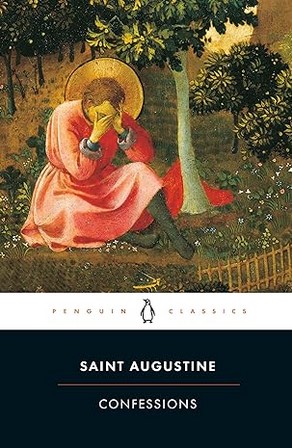
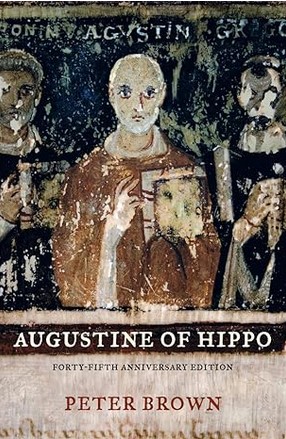
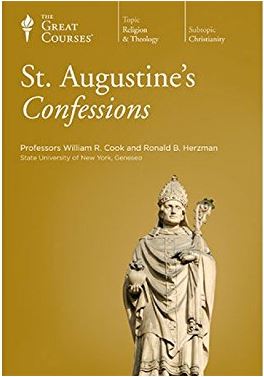
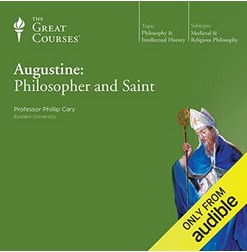
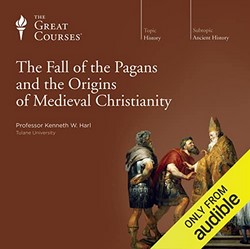

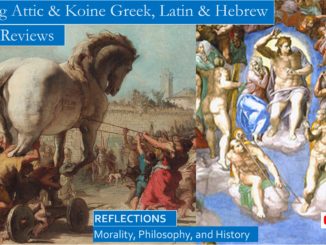
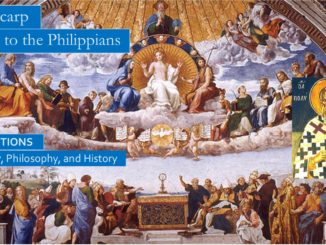
4 Trackbacks / Pingbacks